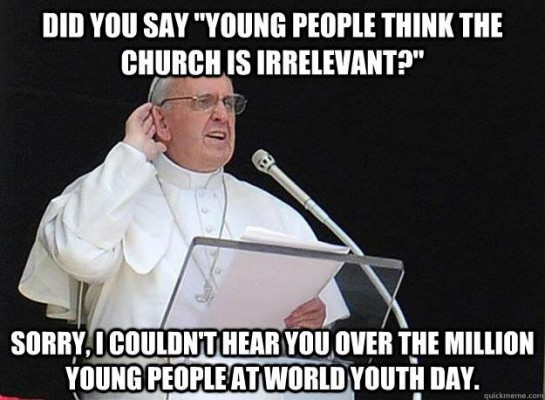You've seen them around, I'm sure. If you have a Facebook account you have seen them pop up in your news feed and shared them. You may have even created one or two. They make you laugh or even make you angry, but they always get your attention.

They're memes (pronounced meemz) and they are the basic unit of political and social commentary in the world today.
We've gone from books to magazines to blogs to Facebook statuses to tweets to memes for taking our thoughts to the world. The time we spend communicating our thoughts to one another has gotten shorter and shorter. Now, it's all picture driven and unexpectedly funny.
Using humor to change attitudes is not a new idea. For years, humorists have used their wit to poke fun at people's prejudices and society's ills. Mark Twain and Will Rogers used it to poke fun at the ridiculous antics of the American Government. More recently, shows like ABC's "Modern Family" and Ellen DeGeneres' syndicated talk show have very successfully used humor to champion gay rights. Because of the war being waged on Catholicism by our culture at-large, it's no surprise that Catholics have learned to fight fire with fire, because humor works to lower defenses and snark gets attention.

Recently, I had the chance to interview Ryan Scheel, editor of CatholicMemes.com, to talk to him about memes and how they are changing the face of Facebook and starting discussions in unlikely places.
CM: Are you the sole creator of the "brand-name" Catholic Memes or do you collaborate?
Ryan: I am the sole editor of Catholic Memes, but at least 50% of the content is user-generated, so it would be unfair to say that I am solely responsible. The page gets content from people from all over the world, and from every vocation. Seminarians and clergy have been particularly active which I would not have suspected when I started the page.
CM: In one sentence, how would you define the term "meme"? (Because back in the old days of blogging it meant something completely different.)
Ryan: An Internet meme is, for lack of a better definition, an inside joke among Internet users that typically consists of an image that gets passed from one user to the next with an overlaid formulaic text that, to those versed in Internet culture, carries with it an immediately recognizable meaning.
CM: Memes seem to have an impact that longer forms of communication don't. What made you think to put your Catholic faith together with this form of communication?
Ryan: Shakespeare said in Hamlet “Brevity is the soul of wit”. In today’s world people are bombarded with message at all times and from all angles, and chances are you will only get the briefest of opportunities to catch pique somebody’s interest.
My goal was to attempt to summarize the depth and complexity of the Catholic life into small, bite-sized pieces that would appeal to the young people who are nearly constant Internet users. Memes provided a very simple and already recognized way to do that.
Essentially, I just did what Catholics have always done: use what was popular in culture to spread and explain the faith.
CM: Reactions to your memes (both on your page and on pages of those who share your memes) are never lukewarm and always start a discussion. When you first started making them, did you see them as "thought bombs" or "discussion starters"?
Ryan: There are times when I know that a post will cause a lot discussion and be against what the culture wants to hear, but those are the posts that people on both sides tend to gravitate towards.
I certainly don’t try water down anything to be more popular, and I think that is why the page has been successful. Lukewarm things get spit out, as scripture tells us.
As Catholics, we should joyfully embrace our role as outsiders, as signs of contradiction. So it really shouldn’t be surprising that thoughts that are distinctly Catholic will be controversial to modern secular society.
CM: You have tangled with Facebook Admin at least once that I know of. How do you balance the culture's idea of "hate-speak" with saying what needs to be said? Are things getting more strict or have you won some ground back for free-speech in those conflicts?
Ryan: Humor has a way of disarming people. It makes them let their guard down and be more relaxed, so I am sometimes able to say some pretty counter-cultural things without people realizing it.
But there are some issues that those who are always talking about tolerance will not tolerate opposing views about. But truth is truth, even if nobody believes it, or wants to hear it, so you say what needs to be said, regardless of the reaction.
Sadly, the people who run and make the policies for the larger social media sites tend to side with those views opposed to the truth of the Church. It is frustrating when they censor you for supporting traditional values while they turn a blind eye to absolutely vitriolic anti-Catholicism.
But I think Christianity has always performed better when it was against the culture, because that is precisely where its transcendent dynamism exists, in its opposition to the fallen nature of the world.
CM: Evangelization takes many forms and this is obviously one of them. Did you intend for this project to be evangelical in nature or kind of an insider humor thing?
Ryan: It was both actually. This was always meant to be Evangelical in nature, but specifically in the vein of the New Evangelization. It was geared towards Catholics who forgot how great and joyful it is to be a Catholic, and towards Protestants and non-believers who had misconceptions about Catholicism.
You can visit Catholic Memes on Facebook. You can also find Ryan at uCatholic.com providing resources for Catholics in the modern world.
Copyright 2013 Katie O'Keefe



.png?width=1806&height=731&name=CatholicMom_hcfm_logo1_pos_871c_2728c%20(002).png)
Comments